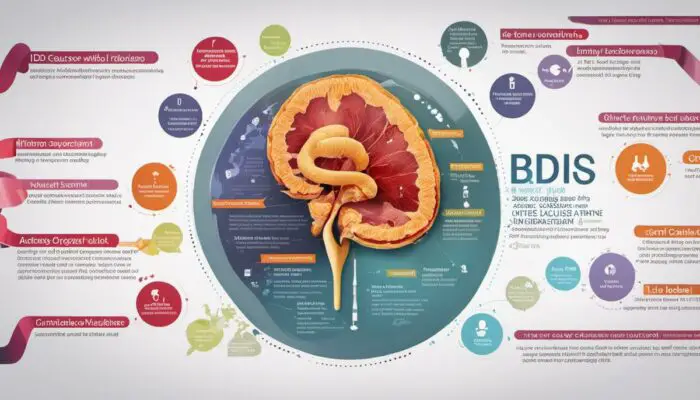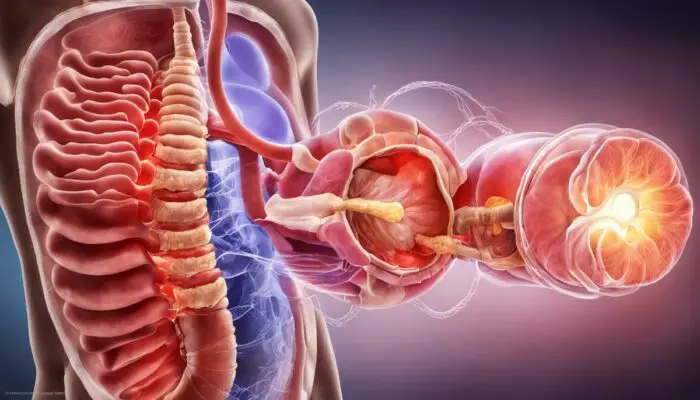Paediatric Inflammatory Bowel Disease (IBD), a term covering conditions like Crohn’s disease and Ulcerative Colitis, is a stark reality for many UK children. Within this context, understanding exactly what this disease entails, its symptoms, diagnostics, treatments, and managing life with it, become paramount for parents, caregivers, and the wider public.
Therefore, this write up provides insight into this chronic illness that affects a child’s gastrointestinal (GI) tract, potentially disrupting their normal growth and development. By elucidating the complexities of IBD, we can equip ourselves with the right knowledge and take a proactive role in managing it.
Understanding Paediatric IBD: A Guide To Parents
Paediatric Inflammatory Bowel Disease, commonly termed as Paediatric IBD, is a condition that causes inflammation of the intestines. It primarily includes two types of chronic disorders: Crohn’s disease and ulcerative colitis. Both these disorders involve long-term swelling and damage to the digestive tract, causing long-lasting discomfort and disruption to the affected child’s life.
The Digestive System: A Brief Overview
The digestive system plays a pivotal role in the body. It is a complex system that starts from the mouth and ends at the anus. It essentially works to break down food, absorb nutrients and expel waste materials from the body. The path food undertakes as it goes through the digestive system includes major stops at the oesophagus, stomach, and intestines.
The intestines are further classified into the small intestine and the large intestine or colon. The small intestine is where absorption of most nutrients occurs. The large intestine further processes the leftovers, ensuring water absorption and converting them into stool, which is later expelled.
Paediatric IBD: Occurrence and Impact
The exact cause of Paediatric IBD is unknown, but it is believed to be the result of a combination of genetic predisposition, an altered immune system response, and environmental factors. The altered immune system, instead of fighting off harmful pathogens, mistakenly targets the body’s own cells in the guts, causing persistent inflammation.
IBD is not limited to adults and can occur in children as well. In cases of paediatric onset, the disease often tends to be more aggressive and extensive, involving higher risks for complications. It can significantly impact a child’s growth, development, and quality of life.
The Symptoms
Symptoms of paediatric IBD may vary depending on the type and severity of the condition. Common indications include abdominal pain, diarrhoea, blood in the stool, unexplained weight loss, fatigue, and in some cases, delayed growth and development.
For children suffering from Crohn’s disease, inflammation can occur anywhere along the digestive tract but is commonly found at the end of the small intestine. Meanwhile, ulcerative colitis confines itself to the colon and rectum.
Understanding the Diagnosis and Treatment of Paediatric IBD
Identifying paediatric Inflammatory Bowel Disease (IBD) often comes through a battery of tests including blood samples to rule out anaemia or any infections, stool examinations in search of occult blood or bacterial presence, and various imaging modalities to visualise the inner lining of the digestive tract.
The typical course of treatment primarily focuses on controlling the inflammation with pertinent medication, reducing the presenting symptoms, and promoting sustained remission of the disease. However, in particularly severe instances, surgical intervention might be necessary.
Living with Paediatric IBD is about more than just medical treatment, as the condition significantly impacts day-to-day life. This chronic condition demands substantial adjustments to dietary practices, overall lifestyle, and even everyday activities.
Hence, pertinent support, be it medical or otherwise, plays a substantial role in successful management of the disease, enabling the child to enjoy the best possible quality of life, in spite of the inherent challenges associated with the condition.

Recognising the Symptoms of Paediatric IBD
Recognising the Common Symptoms of Paediatric IBD
The process of diagnosing Inflammatory Bowel Disease (IBD) in children can often be more complex compared to adults due to the wide spectrum of symptoms they may exhibit. Among the most frequently encountered symptoms is chronic abdominal discomfort. This isn’t simply a run-of-the-mill stomach ache but is instead characterised by long-standing pain, which often intensifies after meals. Another common sign pointing towards paediatric IBD is gastrointestinal unrest. This typically presents as persistent diarrhoea, possibly containing blood or mucus which signals inherent issues within the digestive tract itself.
Unusual Signs of Paediatric IBD
However, IBD in children isn’t solely confined to gastrointestinal symptoms. Some children may exhibit less common symptoms. They may suffer from chronic fatigue and inexplicably lose weight despite maintaining a regular diet. Children may also experience issues related to growth. Paediatric IBD can slow growth due to nutritional deficiencies from poor absorption of nutrients caused by the disease, potentially resulting in a decreased growth rate.
Behavioural Changes and Paediatric IBD
IBD does not only present physical symptoms but can also induce changes in a child’s behaviour. Children might start behaving differently, due to the chronic pain they’re experiencing. Signs can include increased irritability, lesser enthusiasm towards previously enjoyed activities, and marked changes in school performance. Paediatric IBD may also affect a child’s appetite, with them refusing food or eating less, a change that parents and caregivers should note.
Paediatric IBD Symptom Variations
The cardinal symptoms of IBD, including diarrhoea and abdominal pain, dominate in many cases; nevertheless, variations may occur depending on the IBD type, age of the child, and disease severity. For example, children with Crohn’s disease, a type of IBD, may experience additional symptoms such as mouth ulcers or skin rashes. Some children with Ulcerative Colitis, another form of IBD, may pass frequent, small amounts of stool, often mistaken for constipation. Recognising these potential variations is crucial in achieving an accurate diagnosis.
Recognising the Symptoms of Paediatric IBD
Should your child manifest consistent symptoms such as chronic abdominal discomfort, long-term diarrhoea, inexplicable weight loss, unexplained fatigue, or growth issues, it is crucial to seek immediate medical intervention. Additionally, noticeable shifts in behaviour or eating habits, particularly if these come alongside the more typical symptoms mentioned previously, should encourage you to consider the advice of a medical professional. Early diagnosis and treatment of paediatric IBD through a comprehensive medical evaluation can lead to the potential for more favourable disease progression and increase the child’s quality of life.

Diagnosing Paediatric IBD: Tests and Procedures
Comprehending Paediatric IBD
Paediatric Inflammatory Bowel Disease (IBD) is an umbrella term applicable to two chronic maladies, specifically Crohn’s Disease and Ulcerative Colitis. These conditions are characterised by inflammation occurring within the child’s gastrointestinal tract. The symptoms, although varying, common manifestations include discomfort in the abdomen, diarrhoea, weight reduction, and intense fatigue. To reach a correct diagnosis of paediatric IBD, various tests and medical procedures are necessitated.
Initial Consultation
The diagnostic process typically begins with an initial consultation with a paediatric gastroenterologist. At this stage, the doctor will carry out a detailed review of the child’s medical history, taking into account any symptoms and their duration. The doctor will also assess whether there’s a family history of IBD, as this can significantly increase a child’s risk.
During the consultation, the doctor will perform a physical examination on the child. This exam might include checking for areas of tenderness or pain in the abdomen, looking for signs of malnutrition or growth failure, which could be indicative of IBD.
Diagnostic Tests and Procedures
Following the consultation, several tests are carried out to confirm or exclude the diagnosis of paediatric IBD. Blood tests are usually ordered to check for anaemia, increased inflammatory markers, vitamin deficiencies or other signs of malnutrition. Stool samples are also commonly analysed to detect any signs of infection or inflammation.
The most definitive way of diagnosing paediatric IBD however is through endoscopy, which includes two procedures, a colonoscopy or an upper gastrointestinal endoscopy. These procedures involve the use of a thin, flexible tube with a camera, called an endoscope, to examine the digestive tract. Biopsies, or small tissue samples, are often taken during endoscopy for further analysis.
Other imaging tests such as CT scans or MRI scans may also be conducted to provide a more comprehensive view of the extent and severity of inflammation, and to detect any complications.
The Role of Nutrition
A thorough diet assessment by a registered dietitian is an essential part of the diagnostic process. This is to assess a child’s nutritional status and growth, as IBD can often lead to delays in growth and weight gain. The dietitian may also initiate specific dietary therapies which have been shown to be effective for inducing remission in IBD.
Psychological Support
It’s likewise important to focus on the psychological aspect of the diagnostic process. A child psychologist may be involved in helping children and families manage the emotional stress often associated with chronic illnesses like IBD.
Follow-Up Consultation
Once a diagnosis of paediatric inflammatory bowel disease (IBD) has been made, subsequent follow-up consultations are crucial to assess test results and discuss ideal treatment strategies. The therapeutic approach towards paediatric IBD typically involves a blend of medication, nutritional therapy, and occasionally, surgical intervention. The end goal is always to reinstate regular growth and development and to facilitate a high-quality life.
Grasping the required tests and procedures for diagnosing paediatric IBD illustrates the necessity for a multidisciplinary approach. This intricate process involves not only medical examinations but also dietary and psychological assessments. Being aware of what the diagnostic procedure entails aids children and their parents in mentally and physically preparing for the forthcoming journey.

Potential Treatment and Management of Paediatric IBD
Paediatric IBD (Inflammatory Bowel Disease)
encapsulates a group of conditions characterised by chronic inflammation of the digestive tract, which includes diseases such as Crohn’s disease and ulcerative colitis. These conditions primarily disrupt the daily lives and pose health challenges for the afflicted children and teenagers. Nonetheless, thanks to continuous research and medical advancements, there are now numerous strategies available for managing and treating Paediatric IBD effectively.
Medication for Pediatric IBD
When it comes to medication, two general categories are offered: aminosalicylates and corticosteroids. Aminosalicylates, including medications like Sulfasalazine and Mesalazine, are anti-inflammatory treatments. They are used primarily in treating mild to moderate IBD symptoms, often for ulcerative colitis. However, their contribution in treating Crohn’s disease is still debated. On the other hand, corticosteroids are short-term medications primarily employed for the moderate to severe IBD conditions. Prednisolone is a common corticosteroid offering symptomatic relief during active IBD flares.
Biologic Therapies for Pediatric IBD
Biologic therapies, a new wave treatment that targets specific molecules involved in the inflammatory process, have also been introduced to the Pediatric IBD management. Infliximab and Adalimumab, two vital biologics, offer promising success in children whose symptoms react poorly to conventional drugs. Ustekinumab, another biologic agent, provides sustained relief for paediatric Crohn’s Disease.
Surgical Options for Pediatric IBD
When medication proves ineffective, surgery becomes a potential option for Pediatric IBD. Specific surgical interventions depend on the type of IBD. For Crohn’s Disease, common surgeries include strictureplasty or resection through small incisions. For ulcerative colitis, proctocolectomy (removal of the colon and rectum) with ileal pouch-anal anastomosis (creation of a faux rectum from the small intestine) is a standard procedure.
Dietary Management for Pediatric IBD
Diet plays a crucial role in managing paediatric IBD, often accompanying medication treatments. A guided diet serves to provide nutrients, address growth concerns, decrease inflammation, and manage symptoms. Specialised diets like ‘Exclusive Enteral Nutrition (EEN),’ where a patient consumes a liquid diet with specific nutrients, have demonstrated effectiveness in reducing inflammation in Crohn’s Disease. Nevertheless, dietary interventions should be adapted to each child’s needs and monitored by a trained dietitian to ensure balanced nutrition for growth and development.
Understanding Paediatric IBD
Paediatric Inflammatory Bowel Disease (IBD) includes two long-term conditions, Crohn’s disease and Ulcerative Colitis, which cause inflammation within the digestive tract. These conditions can place a significant psychological burden on children, necessitating unique support and comprehension from their caregivers as well as healthcare professionals.

Living with Paediatric IBD: Counselling and Support
Emotional Support for Pediatric IBD
The treatment plan for Paediatric IBD is complex and multifaceted, involving medication, potential surgical procedures, and adjustments in diet. Although these measures provide relief and control over the disease, emotional backing is equally crucial to alleviate the stress and anxiety these children face. Psychiatric counselling and local IBD support groups play a significant role in providing this much-needed comfort.
Psychological Impacts
The psychological impact of Paediatric IBD can be immense, particularly given the invasive nature of treatment procedures, the unpredictable course of the illnesses, and the need for chronic care. Children experiencing this illness may undergo severe emotional distress, including anxiety, depression, and a decreased quality of life.
The Need for Professional Help
Psychologists, therapists, and counsellors are often an integral part of a child’s multidisciplinary care team, providing critical emotional and psychological support. Cognitive behavioural therapy (CBT), for example, can help children and adolescents to cope with their anxiety and learn new ways of thinking about and addressing their condition, which can ultimately contribute to a better quality of life.
Support Groups and Online Communities
In addition to qualified mental health professionals, support groups and online communities can offer a safe space for children and families affected by paediatric IBD to discuss, relate, and share experiences. Children with IBD can engage with others going through similar situations, and their families can exchange information, advice, and words of encouragement. These resources are not a replacement for professional help but should be viewed as part of a comprehensive support network.
Parental Support
Parents play a pivotal role in providing emotional support to their child suffering from IBD. Acknowledging their child’s feelings and encouraging open conversation can help the child voice their fears and anxieties. Offering constant validation and reassurance, maintaining a positive outlook, and providing physical comfort, like cuddling or hugging during painful flare-ups, can greatly alleviate stress and anxiety and contribute to an increased sense of security for the child.
Support at School
Schools also need to play their part in providing support to students with IBD. Educating teachers and staff about the disease, its symptoms, and its treatment can help create an inclusive environment and pave the way for needed accommodations, such as extra bathroom breaks or adjustments to physical education classes. Collaboration among parents, health care providers, and educators can help students with IBD have a positive and successful school experience.
In summary, with appropriate psychological support, counselling, and a solid support network, children living with paediatric IBD can navigate their disease and lead fulfilling lives. It takes a shared effort from parents, healthcare professionals, schools, and support groups to provide the necessary tools and resources to help these children and their families deal effectively with the challenges of the disease.

The journey of living with paediatric IBD is undoubtedly challenging, filled with regular doctor’s visits, medication routines, lifestyle alterations, and emotional turmoil. However, with a solid understanding of the disease, proactive management, and the right psychological support, children can lead fulfilling lives while managing their condition.
Emphasising education about paediatric IBD and advocating for robust psychological support can help mitigate the challenges faced by families dealing with the condition. The goal is to foster a healthy dialogue about paediatric IBD, making it less of a stigma and more of an understood reality, empowering these young patients to face their journey with courage and resilience.





